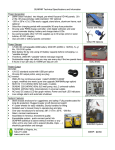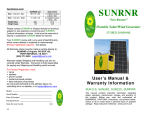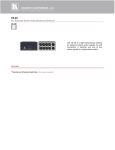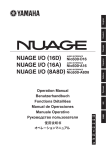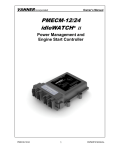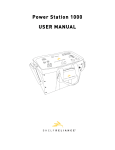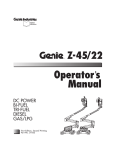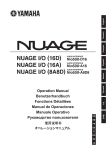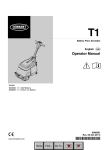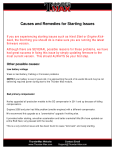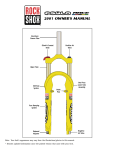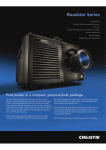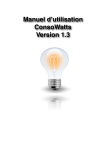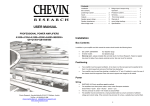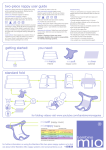Download How do they compare?
Transcript
Technical Specifications Explained and Compared SUNRNR Technical Specifications and Information What does this mean to you? How does it compare? Why does it matter? Power Generation (Kyocera KD140SX) ● 280W Solar Included: two hinged, prewired panels; 20+ yr life; 30’ plugandplay cable standard; up to 150’ optional ● ~59”h x 26”w x 2”d, 27lbs each; rugged; standalone, aluminum frame; rack optional ● 30amp solar PWM charge controller: LCD digital voltmeter and solar current ammeter display; battery and charge status LEDs ● Solar/Aux charging portals with accessible 30amp fuse protection ● ● ● ● ● Recharge a fully discharged SUNRNR in 10 hours of bright sun (be sure to compare battery sizes when comparing recharge times) Place unit where power is needed and panels where the sun is shining Panels are sized to charge battery at rate for best battery health Use unit with or without panels connected SUNRNRs are prewired for panels and other energy sources Aux portal accepts other 12V DC supplies up to 30A (wind/water turbine, ACDC charger, bicycle) Power Storage (Deka 8A8D) ● 12VDC rechargeable AGM battery: 2940 Wh (245Ah x 12VDC), 5+ yr life, 1503100 cycles ● Best battery life by only using 2/3 battery capacity before recharging, i.e. “usable storage” ● 2000 Wh “usable” before recharge required ● Sustainable usage rate (what you may use every day if the two panels have 6 hours of sun per day) is 1500W per day per unit ● Replaceable and recyclable ● LiIon batteries have advantages, but not good for high surge output optional upgrade, but high cost Panels with Rack Other RE Generation Options ● Smallerbattery systems are limited as to supplemental daily usage or emergency backup (e.g. 600Wh can only run a fridge 4 hours per day ) ● 1500W/day is about 5% of average US home use (only ~ $73/yr, but reduces demand on utility, too) ● For example, at sustainable usage rate, a SUNRNR can run a refrigerator 8 days out of 10 or provide power for 2 loads of laundry per day or run a 3/4Hp well pump daily or power tools at a construction site ● A SUNRNR is not just for emergency backup power best battery life achieved with usage Deka nonspillable, absorbed glass mat, 245Ah, 160lb, rechargeable battery Power Output DC ● 12V DC standard socket (convertible to USB port) ● Highamp DC output using aux plug or link cord ● SUNRNRs offer various direct DC outputs ● USB ports are convenient, but low amperage. Products focusing on USB outlets might be best at charging phones, not powering appliances. 1 Power Output AC Inverter ● 3500+W max continuous power (rated 5,000W/10,000W surge); modified sine wave ● SUN110 110120VAC 60Hz (US standard wall) ● SUN240 220240VAC 60Hz (US well pump, etc) ● SUN220 220VAC 50Hz (international) ● Pure sine upgrade (3kW/6kW surge) option ● LED bar graph meters – AC load, DC status ● Power and fault LED indicators ● Low voltage alarm and automatic shutdown ● 4 outlets 110; 2 universal outlets 220240 System Features ● Rugged master on/off disconnect switch ● Steel chassis enclosure for ruggedness and safety; fully powdercoated for longlife protection ● 4” caster wheels for easy rollability ● Sturdy handles for lifting ● 28”l x 15”w x 30”h; ~260 lbs ● Detailed user’s manual ● Oneyear manufacturer’s warranty ● Easy to operate plug and play ● Silent, minimal maintenance ● 75% by value Americanmade components; 100% assembled in America ● Expandable system: quickconnect portal links SUNPWR (identical to above without inverter) or any other unit to any main unit to expand (double, triple, …) electricity generation and storage Price : $4350 MSRP SUN110, SUN240 $3450 MSRP SUNPWR Dealer list included ● Inverter output wattage (continuous/surge) defines how many devices and/or of what power you can run ● For example, a SUNRNR can run a fridge, microwave, fans, lights, TV, and computer simultaneously ● Inverters rated to at least 1800W ensure the running of ANY appliance you can plug into a household outlet ● A 1200W inverter or smaller may not be able to run a 1000W microwave much less any other appliance at the same time ● Many high amp load tools (compressors, well pumps, table saws) only run for short dutycycles, but if you can not start them (surge), you can not run them ● ● ● ● ● ● 110VAC Inverter 220240VAC Inverter Systems using hardened plastic or Pelican Boxes lack the level of safety that SUNRNR’s steel enclosures offer in the unlikely case of battery event Other SUNRNR safety features include the ability to fully disconnect the battery and a design that protects the user from all dangerous electrical connections Of course Chinesemade products will be slightly less expensive than SUNRNRs, but of lesserquality, dependability, and life span SUNRNR System One company in particular has simply copied SUNRNR, the original, patented portable solar electric system, in shape and even color, yet they were unable to match the highcapability and investment quality All SUNRNR systems qualify for the 30% Federal tax credit and many state tax incentives SUNRNR systems are independent, tiny grids ● Be sure to compare apples to apples, not oranges ● Compare cost to Watts, what is included, etc Expandable SUNRNR of Virginia, Inc. 5402713403 www.sunrnr.com 2


